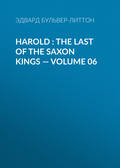
Эдвард Бульвер-Литтон
Godolphin, Complete
CHAPTER XXI
AN EVENT OF GREAT IMPORTANCE TO THE PRINCIPAL ACTORS IN THIS HISTORY.—GODOLPHIN A SECOND TIME LEAVES ENGLAND
Goldolphin was welcomed with enthusiasm by the London world. His graces, his manners, his genius, his bon ton, and his bonnes fortunes, were the theme of every society. Verses imputed to him,—some erroneously, some truly,—were mysteriously circulated from hand to hand; and every one envied the fair inspirers to whom they were supposed to be addressed.
It is not my intention to reiterate the wearisome echo of novelists, who descant on fashion and term it life. No description of rose-coloured curtains and buhl cabinets—no miniature paintings of boudoirs and salons—no recital of conventional insipidities, interlarded with affected criticisms, and honoured by the name of dramatic dialogue, shall lend their fascination to these pages. Far other and far deeper aims are mine in stooping to delineate the customs and springs of polite life. The reader must give himself wholly up to me; he must prepare to go with me through the grave as through the gay, and unresistingly to thread the dark and subtle interest which alone I can impart to these memoirs, or—let him close the book at once. I promise him novelty; but it is not, when duly scanned, a novelty of a light and frivolous cast.
But throughout that routine of dissipation in which he chased the phantom Forgetfulness, Godolphin sighed for the time he had fixed on for leaving the scenes in which it was pursued. Of Constance’s present existence he heard nothing; of her former triumphs and conquests he heard everywhere. And when did he ever meet one face, however fair, which could awaken a single thought of admiration? while hers was yet all faithfully glassed in his remembrance. I know nothing that so utterly converts society into “the gallery of pictures,” as the recollection of one loved and lost. That recollection has but two cures—Time and the hermitage. Foreigners impute to us the turn for sentiment; alas! there are no people who have it less. We seek for ever after amusement; and there is not one popular prose-book in our language in which the more tender and yearning secrets of the heart form the subject-matter. The Corinne and the Julie weary us, or we turn them into sorry jests!
One evening, a little before his departure from England—that a lingering and vague hope, of which Constance was the object, had considerably protracted beyond the allotted time—Godolphin was at a house in which the hostess was a relation to Lord Erpingham.
“Have you heard,” asked Lady G–, “that my cousin Erpingham is to be married?”
“No, indeed; to whom?” said Godolphin, eagerly. “To Miss Vernon.”
Sudden as was the shock, Godolphin heard, and changed neither hue nor muscle.
“Are you certain of this?” asked a lady present.
“Quite: Lady Erpingham is my authority; I received the news from herself this very day.”
“And does she seem pleased with the match?”
“Why, I can scarcely say, for the letter contradicts itself in every passage. Now, she congratulates herself on having so charming a daughter-in-law; now, she suddenly stops short to observe what a pity it is that young men should be so precipitate! Now, she says what a great match it will be for her dear ward! and now, what a happy one it will be for Erpingham! In short, she does not know whether to be pleased or vexed; and that, pour dire vrai, is my case also.”
“Why, indeed,” observed the former speaker, “Miss Vernon has played her cards well. Lord Erpingham would have been a great match in himself, with his person and reputation. Ah! she was always an ambitious girl.”
“And a proud one,” said Lady G–. “Well, I suppose Erpingham House will be the rendezvous to all the blues, and wits, and savans. Miss Vernon is another Aspasia, I hear.”
“I hate girls who are so designing,” said the lady who spoke before, and had only one daughter, very ugly, who, at the age of thirty-five, was about to accept her first offer, and marry a younger son in the Guards. “I think she’s rather vulgar; for my part, I doubt if—I shall patronise her.”
“Well, what do you think of it, Mr. Godolphin?—you have seen Miss Vernon?”
Godolphin was gone.
It was about ten days after this conversation that Godolphin, waiting at a hotel in Dover the hour at which the packet set sail for Calais, took up the Morning Post; and the first passage that met his eye was the one which I transcribe:—
“Marriage in High Life.—On Thursday last, at Wendover Castle, the Earl of Erpingham, to Constance, only daughter of the celebrated Mr. Vernon. The bride was dressed, &c., –” And then followed the trite, yet pompous pageantry of words—the sounding nothings—with which ladies who become countesses are knelled into marriage.
“The dream is over!” said Godolphin mournfully, as the paper fell to the ground; and, burying his face within his hands, he remained motionless till they came to announce the moment of departure.
And thus Percy Godolphin left, for the second time, his native shores. When we return to him, what changes will the feelings now awakened within him, have worked in his character! The drops that trickle within the cavern harden, yet brighten into spars as they indurate. Nothing is more polished, nothing more cold, than that wisdom which is the work of former tears, of former passions, and is formed within a musing and solitary mind!
CHAPTER XXII
THE BRIDE ALONE.—A DIALOGUE POLITICAL AND MATRIMONIAL.—CONSTANCE’S GENIUS FOR DIPLOMACY.—THE CHARACTER OF HER ASSEMBLIES.—HER CONQUEST OVER LADY DELVILLE
“Bring me that book; place that table nearer; and leave me.”
The Abigail obeyed the orders, and the young Countess of Erpingham was alone. Alone! what a word for a young and beautiful bride in the first months of her marriage! Alone! and in the heart of that mighty city in which rank and wealth—and they were hers—are the idols adored by millions.
It was a room fancifully and splendidly decorated. Flowers and perfumes were, however, its chief luxury; and from the open window you might see the trees in the old Mall deepening into the rich verdure of June. That haunt, too—a classical haunt for London—was at the hour I speak of full of gay and idle life; and there was something fresh and joyous in the air, the sun, and the crowd of foot and horse that swept below.
Was the glory gone from your brow, Constance?—or the proud gladness from your eye? Alas! are not the blessings of the world like the enchanted bullets?—that which pierces our heart is united with the gift which our heart desired!
Lord Erpingham entered the room. “Well, Constance,” said he, “shall you ride on horseback to-day?”
“I think not.”
“Then I wish you would call on Lady Delville. You see Delville is of my party: we sit together. You should be very civil to her, and I did not think you were so the other night.”
“You wish Lady Delville to support your political interest; and, if I mistake not, you think her at present lukewarm?”
“Precisely.”
“Then, my dear lord, will you place confidence in my discretion? I promise you, if you will leave me undisturbed in my own plans, that Lady Delville shall be the most devoted of your party before the season is half over: but then, the means will not be those you advise.”
“Why, I advised none.”
“Yes—civility; a very poor policy.”
“D—n it, Constance! why, you would not frown a great person like Lady Delville into affection for us?”
“Leave it to me.”
“Nonsense!”
“My dear lord, only try. Three months is all I ask. You will leave the management of politics to me ever afterwards! I was born a schemer. Am I not John Vernon’s daughter?”
“Well, well, do as you will,” said Lord Erpingham; “but I see how it will end. However, you will call on Lady Delville to-day?”
“If you wish it, certainly.”
“I do.”
Lady Delville was a proud, great lady; not very much liked and not so often invited by her equals as if she had been agreeable and a flirt.
Constance knew with whom she had to treat. She called on Lady Delville that day. Lady Delville was at home: a pretty and popular Mrs. Trevor was with her.
Lady Delville received her coolly—Constance was haughtiness itself.
“You go to the Duchess of Daubigny’s to-night?” said Lady Delville in the course of their broken conversation.
“Indeed I do not. I like agreeable society. It shall be my object to form a circle that not one displeasing person shall obtain access to. Will you assist me, my dear Mrs. Trevor?”—and Constance turned, with her softest smile, to the lady she addressed.
Mrs. Trevor was flattered: Lady Delville drew herself up.
“It is a small party at the duchess’s,” said the latter; “merely to meet the Duke and Duchess of C–.”
“Ah, few people are capable of giving a suitable entertainment to the royal family.”
“But surely none more so than the Duchess of Daubigny—her house so large, her rank so great!”
“These are but poor ingredients towards the forming of an agreeable party,” said Constance, coldly. “The mistake made by common minds is to suppose titles the only rank. Royal dukes love, above all other persons, to be amused; and amusement is the last thing generally provided for them.”
The conversation fell into other channels. Constance rose to depart. She warmly pressed the hand of Mrs. Trevor, whom she had only seen once before.
“A few persons come to me to-morrow evening,” said she; “do waive ceremony, and join us. I can promise you that not one disagreeable person shall be present; and that the Duchess of Daubigny shall write for an invitation and be refused.”
Mrs. Trevor accepted the invitation.
Lady Delville was enraged beyond measure. Never was female tongue more bitter than hers at the expense of that insolent Lady Erpingham! Yet Lady Delville was secretly in grief; for the first time in her life, she was hurt at not having been asked to a party: and being hurt because she was not going, she longed most eagerly to go.
The next evening came. Erpingham House was not large, but it was well adapted to the description of assembly its beautiful owner had invited. Statues, busts, pictures, books, scattered or arranged about the apartments, furnished matter for intellectual conversation, or gave at least an intellectual air to the meeting.
About a hundred persons were present. They were selected from the most distinguished ornaments of the time. Musicians, painters, authors, orators, fine gentlemen, dukes, princes, and beauties. One thing, however, was imperatively necessary in order to admit them—the profession of liberal opinions. No Tory, however wise, eloquent or beautiful, could, that evening, have obtained the sesame to those apartments.
Constance never seemed more lovely, and never before was she so winning. The coldness and the arrogance of her manner had wholly vanished. To every one she spoke; and to every one her voice, her manner, were kind, cordial, familiar, but familiar with a soft dignity that heightened the charm. Ambitious not only to please but to dazzle, she breathed into her conversation all the grace and culture of her mind. They who admired her the most were the most accomplished themselves.
Now exchanging with foreign nobles that brilliant trifling of the world in which there is often so much penetration, wisdom, and research into character; now with a kindling eye and animated cheek commenting, with poets and critics, on literature and the arts; now, in a more remote and quiet corner, seriously discussing, with hoary politicians, those affairs in which even they allowed her shrewdness and her grasp of intellect; and combining with every grace and every accomplishment a rare and dazzling order of beauty—we may readily imagine the sensation she created, and the sudden and novel zest which so splendid an Armida must have given to the tameness of society.
The whole of the next week, the party at Erpingham House was the theme of every conversation. Each person who had been there had met the lion he had been most anxious to see. The beauty had conversed with the poet, who had charmed her; the young debutant in science had paid homage to the great professor of its loftiest mysteries; the statesman had thanked the author who had defended his measures; the author had been delighted with the compliment of the statesman. Every one then agreed that, while the highest rank in the kingdom had been there, rank had been the least attraction; and those who before had found Constance repellent, were the very persons who now expatiated with the greatest rapture on the sweetness of her manners. Then, too, every one who had been admitted to the coterie dwelt on the rarity of the admission; and thus, all the world were dying for an introduction to Erpingham House—partly, because it was agreeable—principally, because it was difficult.
It soon became a compliment to the understanding to say of a person, “He goes to Lady Erpingham’s!” They who valued themselves on their understandings moved heaven and earth to become popular with the beautiful countess. Lady Delville was not asked; Lady Delville was furious: she affected disdain, but no one gave her credit for it. Lord Erpingham teased Constance on this point.
“You see I was right; for you have affronted Lady Delville. She has made Delville look coolly on me; in a few weeks he will be a Tory; think of that, Lady Erpingham!”
“One month more,” answered Constance, with a smile, “and you shall see.”
One night, Lady Delville and Lady Erpingham met at a large party. The latter seated herself by her haughty enemy; not seeming to heed Lady Delville’s coolness, Constance entered into conversation with her. She dwelt upon books, pictures, music: her manner was animated, and her wit playful. Pleased, in spite of herself, Lady Delville warmed from her reserve.
“My dear Lady Delville,” said Constance, suddenly turning her bright countenance on the countess with an expression of delighted surprise, “will you forgive me?—I never dreamed before that you were so charming a person! I never conceal my sentiments: and I own with regret and shame that, till this moment, I had never seen in your mind—whatever I might in your person—those claims to admiration which were constantly dinned into my ear.”
Lady Delville actually coloured.
“Pray,” continued Constance, “condescend to permit me to a nearer acquaintance. Will you dine with us on Thursday?—we shall have only nine persons beside yourself: but they are the nine persons whom I most esteem and admire.”
Lady Delville accepted the invitation. From that hour, Lady Delville—who had at first resented, from the deepest recess of her heart, Constance Vernon’s accession to rank and wealth,—who, had Constance deferred to her early acquaintance, would have always found something in her she could have affected to despise; from that hour, Lady Delville was the warmest advocate, and a little time after, the sincerest follower, of the youthful countess.
CHAPTER XXIII
AN INSIGHT INTO THE REAL GRANDE MONDE;—BEING A SEARCH BEHIND THE ROSE-COLOURED CURTAINS
The time we now speak of was the most brilliant the English world, during the last half century, has known. Lord Byron was in his brief and dazzling zenith; De Stael was in London; the Peace had turned the attention of rich idlers to social enjoyment and to letters. There was an excitement, and a brilliancy, and a spirituality, about our circles, which we do not recognise now. Never had a young and ambitious woman—a beauty and a genius—a finer moment for the commencement of her power. It was Constance’s early and bold resolution to push to the utmost—even to exaggeration—a power existing in all polished states, but now mostly in this,—the power of fashion! This mysterious and subtle engine she was eminently skilled to move according to her will. Her intuitive penetration into character, her tact, and her grace, were exactly the talents Fashion most demands; and they were at present devoted only to that sphere. The rudeness that she mingled, at times, with the bewitching softness and ease of manner she could command at others, increased the effect of her power. It is much to intimidate as well as to win. And her rudeness in a very little while grew popular; for it was never exercised but on those whom the world loves to see humbled. Modest merit in any rank; and even insolence, if accompanied with merit, were always safe from her satire. It was the hauteur of foolish duchesses or purse-proud roturiers that she loved, and scrupled not, to abase.
And the independence of her character was mixed with extraordinary sweetness of temper. Constance could not be in a passion: it was out of her nature. If she was stung, she could utter a sarcasm; but she could not frown or raise her voice. There was that magic in her, that she was always feminine. She did not stare young men out of countenance; she never addressed them by their Christian names; she never flirted—never coquetted: the bloom and flush of modesty was yet all virgin upon her youth. She, the founder of a new dynasty, avoided what her successors and contemporaries have deemed it necessary to incur. She was the leader of fashion; but—it is a miraculous union—she was respectable!
At this period, some new dances were brought into England. These dances found much favour in the eves of several great ladies young enough to dance them. They met at each other’s houses in the morning to practise the steps. Among these was Lady Erpingham; her house became the favourite rendezvous.
The young Marquis of Dartington was one of the little knot. Celebrated for his great fortune, his personal beauty, and his general success, he resolved to fall in love with Lady Erpingham. He devoted himself exclusively to her; he joined her in the morning in her rides—in the evening in her gaieties. He had fallen in love with her?—yes!—did he love her?—not the least. But he was excessively idle!—what else could he do?
Constance early saw the attentions and designs of Lord Dartington. There is one difficulty in repressing advances in great society—one so easily becomes ridiculous by being a prude. But Constance dismissed Lord Dartington with great dexterity. This was the occasion:—
One of the apartments in Erpingham House communicated with a conservatory. In this conservatory Constance was alone one morning, when Lord Dartington, who had entered the house with Lord Erpingham, joined her. He was not a man who could ever become sentimental; he was rather the gay lover—rather the Don Gaolor than the Amadis; but he was a little abashed before Constance. He trusted, however, to his fine eyes and his good complexion—plucked up courage; and, picking a flower from the same plant Constance was tending, said,—
“I believe there is a custom in some part of the world to express love by flowers. May I, dear Lady Erpingham, trust to this flower to express what I dare not utter?”
Constance did not blush, nor look confused, as Lord Dartington had hoped and expected. One who had been loved by Godolphin was not likely to feel much agitation at the gallantry of Lord Dartington; but she looked gravely in his face, paused a little before she answered, and then said, with a smile that abashed the suitor more than severity could possibly have done:—
“My dear Lord Dartington, do not let us mistake each other. I live in the world like other women, but I am not altogether like them. Not another word of gallantry to me alone, as you value my friendship. In a crowded room pay me as many compliments as you like. It will flatter my vanity to have you in my train. And now, just do me the favour to take these scissors and cut the dead leaves off that plant.”
Lord Dartington, to use a common phrase, “hummed and hawed.” He looked, too, a little angry. An artful and shrewd politician, it was not Constance’s wish to cool the devotion, though she might the attachment, of a single member of her husband’s party. With a kind look—but a look so superior, so queen-like, so free from the petty and coquettish condescension of the sex, that the gay lord wondered from that hour how he could ever have dreamed of Constance as of certain other ladies—she stretched her hand to him.
“We are friends, Lord Dartington?—and now we know each other, we shall be so always.”
Lord Dartington bowed confusedly over the beautiful hand he touched; and Constance, walking into the drawing-room, sent for Lord Erpingham on business—Dartington took his leave.







